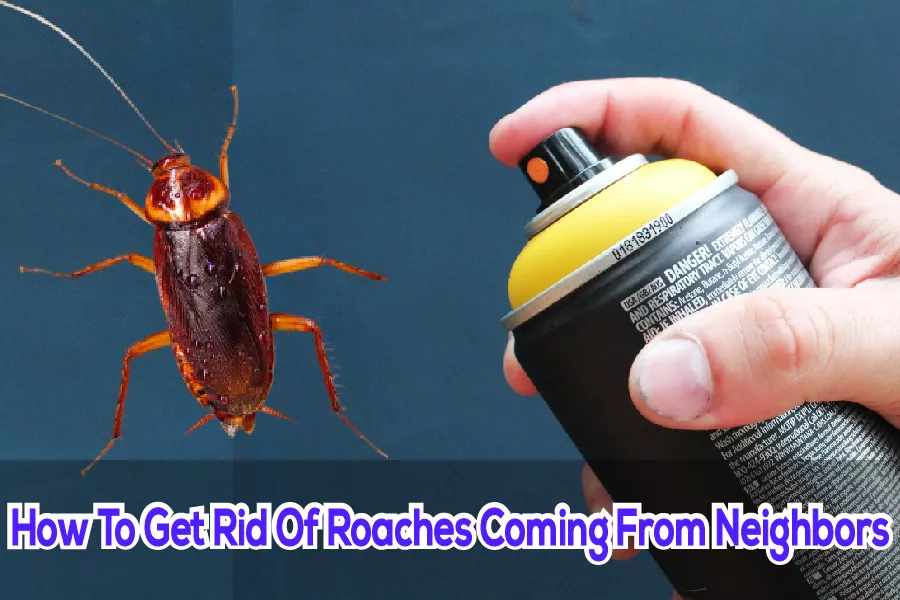Dealing with cockroaches on your property can be a tad of a challenge. These pesky creatures are masters of hiding. They also reproduce rapidly. Only a few roaches are enough to start a full-on infestation.
It is prudent that you nip the problem in the bud. The best way to avoid infestation on your property is to decimate the roach’s population early. But what do you do if these critters are coming from your neighbor’s house?
Dealing with roaches from your neighbor’s property is challenging. You have no control over what happens on the other side of the fence, but you can take measures to keep the critters at bay.
Roaches from your neighbor’s house may spread over to your property, as these insects tend to migrate in droves if they are looking for new places to feed and breed.
How To Get Rid Of Roaches Coming From Your Neighbors
If you notice that roaches from your neighbor’s house are coming onto your property, there are three steps that you should take:
- Try to prevent infestation.
- Confront your neighbor.
- Inform your landlord if you live in a rental.
Try To Prevent Infestation
Though your neighbor is legally liable for damages caused by infestation on your property, it is in your best interest to prevent infestation.
You can take several steps to prevent these creatures from breeding and spreading in your home. Here are some solutions:
1. Fix any leaking pipes
Roaches are attracted to damp or wet environments. They provide sufficient means for hydration, and roaches love such environments. You will force roaches to migrate in search of water by sealing leaks.
2. Seal any food in your house
Ultimately, the reason why roaches will move into your house is to access food. It would help if you sealed all food in containers. Roaches can survive even on very little food. By depriving these creatures of food, they will be forced to migrate.
3. Keep your house tidy
A tidy house should be enough to keep roaches at bay. Roaches thrive in dirty environments. Where there’s dust or gunk, roaches will breed. Be sure to clean up any crumbs or food particles, especially in the kitchen.
Do not leave dishes undone on the sink.
4. Seal any cracks in the house
Roaches are adept at hiding. These creatures spend most of their days in tiny crevasses. They emerge to search for food. Roaches may store food in their hiding spaces, which means that they could go unnoticed for weeks.
Cracks or holes make ideal breeding spaces. It can be a nightmare to deal with roaches breeding in your walls.
5. Get rid of the trash
Do not leave trash exposed. If you do not plan on disposing of your trash anytime soon, it would be best if you sealed it properly. Regularly dispose of trash. Roaches breed and feed on garbage, so you must never allow them to access it from inside your house.
6. Use bug spray
Spray your house down every day, especially in corners, underneath the refrigerator, and in the kitchen. Use a potent insecticide to get the best results.
7. Use boric acid
Boric acid is harmless to humans but is very toxic to roaches. The acid corrodes the roaches’ insides. It works quickly and is a good way to decimate a cockroach population.
8. Eliminate roach eggs
Roaches lay anywhere between 20 to 50 eggs at a go, depending on the species. These eggs are housed in a protein structure called an ootheca. The ootheca is reddish-brown, and its length is 8mm.
These oothecae protect the eggs until they are ready to hatch. To eliminate the eggs, you should use diatomaceous. Diatomaceous is a substance that erodes from the outside and kills the eggs. The substance is available in grocery stores at an affordable price.
Confronting Your Neighbor
If the roaches come from your neighbor’s house, it is their responsibility. They are liable for any damages caused by the roaches and are responsible for getting the roaches out of your property.
You must immediately inform your neighbor that the roaches from their house are spreading over to your property so that they can make arrangements to deal with the infestation.
Ideally, your neighbor should eliminate the roaches in their house to prevent them from migrating to yours.
You should keep things civil with your neighbor when confronting them about the roaches. Be firm and give them a definite period to take action.
If your neighbor denies liability, and you have sufficient proof that the infestation from their house is spreading to yours, you must take action.
With the help of a legal aide, draft a demand letter informing them to get the roaches out of your property. The letter must have:
- An arbitration notice: It is a legal document given as a notice that you want to enter into arbitration.
- Letter of legal consequence: It is a letter outlining the legal recourse available if the neighbor fails to comply and initiate the process of ridding your property of the roaches.
- Infestation evidence document: It is a document that has proof your house is infested with roaches. It may contain pictures of roaches or ootheca on your property.
- Compensation: Compensation in this sense refers to the money the neighbor has to pay to have your property fumigated. It may also include all damages to property caused by the roaches.
It is well within your rights to sue your neighbor, as long as you can provide sufficient proof that they caused the infestation. You must gather tangible evidence against your neighbor-it can be very difficult.
Informing Your Landlord
If your neighbor’s house is infested, you must inform the landlord is the roaches are moving over to your property.
There are certain cases where the neighbor is fully liable for pest control. The landlord may also be in charge of managing infestation on your property, depending on area laws or leasing agreements.
Legally speaking, the landlord is responsible for ensuring that the property is livable. The law is interpreted that the term livable condition can include an environment free from pests and other undesirable creatures.
Maintaining a livable condition may prompt the landlord to organize fumigation services for the units.
Though the landlord should maintain livable conditions for the tenants, they may not be liable for paying for the fumigation services.
What circumstances make the landlord responsible for paying for fumigation?
The landlord should pay for fumigation if the infestation occurred due to natural factors. An example is a mosquito infestation resulting from the property near a breeding ground like a lake. Natural causes for roach infestation are unlikely to occur.
When is a tenant liable to pay for fumigation?
A tenant is liable to pay for fumigation if the term is expressly provided for in the rental or leasing agreement.
A tenant may also be liable to pay for fumigation if an infestation occurred due to negligence. It may occur due to untidy premises attracting roaches or failure to inform the landlord of an infestation in a reasonable time frame.
In most cases, the exterminators inform the landlord whether or not the tenant was living in conditions that attract roaches. They do so after conducting a thorough inspection of the premises and ascertaining, based on their professional judgment, the cause of the infestation.
Rights Of The Tenant In Case Of Infestation
The tenant has a right to enjoy staying in a livable space upon paying rent. There are rights that a tenant can exercise if the conditions are not up to code.
If the premises become unlivable due to a roach infestation; the law permits the tenant to:
1. Break the lease
A tenant can break the lease without consequence if the premises are infested with roaches. It only applies if the tenant is not responsible for the infestation, and they will need to prove that.
2. Seek alternative accommodation
The tenant is within their rights to seek alternative accommodation at the landlord’s expense. It is only applicable if the landlord ignored the fumigation petition or failed to avail of the service promptly.
3. Withhold rent
A tenant may decide not to pay rent on the property until the problem is addressed. The landlord should not charge the tenant rent if you promptly inform them about the infestation.
Conclusion
The best way of handling an infestation is to prevent it from occurring. Identifying the problem early is vital. Infestations are preventable if the right measures are taken.
As we have seen in the article, there are numerous ways of dealing with roaches coming from your neighbor’s house. Your neighbor can legally be held liable if they cause an infestation on your property if they refuse to handle the problem.
The solutions have varying degrees of success, depending on the nature of the accommodation or property you have with your neighbor.
 Being Human
Being Human




